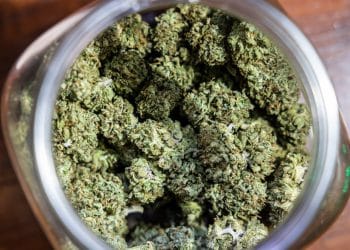In 2021, a Danish pharmaceutical company released a drug that would help treat obesity. The drug was called Wegovy. [1] While originally designed to help manage Type II Diabetes, Wegovy’s primary application today is as a weight loss management drug that may provide an effective tool against obesity.
The World Obesity Foundation estimates that as much as 50 percent of the global population may suffer from obesity by 2035. [3] In fact, even in the last two years, Wegovy is already raising Denmark’s GDP by as much as 1.7%. All of this represents exciting possibilities for the weight-loss industry, but what if it were possible to achieve similar results with a more naturally sourced compound. This may be the case with the cannabinoid, tetrahydrocannabivarin (THCV). Often nicknamed the “diet” cannabis, THCV could prove to be a natural disruptor to a pharmaceutical that may represent billions in annual profits around the world.
What is THCV?
THCV is one of as many of 100 cannabinoids found in various strains of cannabis. [3] Though it was first discovered in the 1970s by Edward Gill, technological limitations prevented the mass production and study of this cannabinoid at the time. [4] Thanks to the explosion of the cannabis industry and growing demand for extracts, THCV can now be produced efficiently and sustainably. This growing availability has also led to an increase in its understanding through more advanced studies of the cannabinoid. The data collection on THCV is still ongoing, especially when it comes to its effects on humans. The early results are promising, though.
For starters, early studies indicate that THCV may help to combat some negative side effects of THC. [5] These side effects include sleepiness, lack of focus, and excessive eating commonly associated with too much THC. One theory explaining this combative effect has to do with THCV working as a CB1 suppressor. [6] CB1 receptors are where THC primarily connects to the human brain, and if THCV works to limit the bonding of THC to these receptors it may explain the lowered effects. Another possible explanation for this has to do with where THCV derives from. Instead of coming from THCA, like many other THC derived cannabinoids, THCV actually comes from CBGVA (cannabigerovarinic acid), giving it a similar molecular structure to CBD. [7] This theory come off as a stretch, but when comparing CBD and THCV’s ability to counteract THC’s risk of psychosis, there may be some factual claims that are worthy of increased analysis. [8] [9]
What are THCV’s Side Effects?
Due to the novelty of THCV, all the psychological and physical effects are still being tallied. That being said, there have been some studies that indicate certain common side effects shared with THC and others that may differ. For example, THCV and THC have both been proven to have anti-inflammatory properties. [10] This means that THCV can also be used to provide minor main relief but with a lower psychoactive response. Additionally, they both also provide neuroprotective benefits, which can be helpful in treating neurological conditions like Parkinson’s disease or epilepsy. [11]
What makes THCV really exciting is how it differs from THC. The most promising of which comes in the form of appetite suppression. [12] This can occur in both the short term and the long term, but in noticeably different ways. In the long term, one study found that consistent doses of THCV helped regulate glucose levels in Type 2 Diabetes patients. [13] This was the intended use of Wegovy, but the short term effects of THCV are even more impressive. For users who take a single dose of 10mg THCV, they report a noticeable difference in how they view food as a reward or an aversion. [14] While the data is still in its early stages, these side effects sound remarkably similar to the benefits Wegovy can provide. One is not a perfect replacement for the other, and certain patients may find they prefer one over the other. When making this decision, it is also worthwhile to consider the neuroprotective, anti-inflammatory, and potentially anti-psychotic effects THCV provides. [15]
Is THCV Safe?
THCV, on its own, is considered safe. This safety has been ascertained both in laboratory and anecdotal evidence. In its naturally occurring form, THCV is often a minor cannabinoid in certain sativa strains. It could be the case that other cannabinoids found in these strains are offsetting any kind of risks that may be associated with it. When isolating the compound for academic review, one study found that after 13 weeks of regular use, THCV users reported no long term side effects. [16]
That being said, there is a substantial difference between the laboratory produced THCV and what may be available to the average consumer in the form of processed cannabis products. Regulatory gaps between legal markets means that cannabis manufacturers may not be subject to the same rigid standards they would be on a federal level.
Ultimately, it is up to each individual to decide what is best for them, and that may require speaking to a doctor to identify potential risks involved both in using this cannabis derivative for obesity management or other existing FDA approved drugs.
While THCV may provide some exciting possibilities as a weight loss supplement or as a new cannabinoid that counteracts THC, both of these aspects have not been studied in depth, and may result in unintended consequences.
References:
- News details. (n.d.). Novo Nordisk. https://www.novonordisk.com/news-and-media/news-and-ir-materials/news-details.html?id=86334
- World Obesity Foundation. (2021, March). World Obesity Atlas 2023. World Obesity Foundaton. Retrieved November 15, 2023, from https://data.worldobesity.org/publications/WOF-Obesity-Atlas-V5.pdf
- Schrot, Richard J., and John R. Hubbard. “Cannabinoids: medical implications.” Annals of medicine 48.3 (2016): 128-141.
- Pertwee, Roger G. “Cannabinoid pharmacology: the first 66 years.” British journal of pharmacology 147.S1 (2006): S163-S171.
- Pertwee, RG2219532. “The diverse CB1 and CB2 receptor pharmacology of three plant cannabinoids: Δ9‐tetrahydrocannabinol, cannabidiol and Δ9‐tetrahydrocannabivarin.” British journal of pharmacology 153.2 (2008): 199-215.
- Riedel, Gernot, et al. “Synthetic and plant‐derived cannabinoid receptor antagonists show hypophagic properties in fasted and non‐fasted mice.” British journal of pharmacology 156.7 (2009): 1154-1166.
- Sampson, Peter B. “Phytocannabinoid pharmacology: medicinal properties of Cannabis sativa constituents aside from the “Big Two”.” Journal of Natural Products 84.1 (2020): 142-160.
- Chester, Lucy Ann. Delta-9-Tetrahydrocannabinol, Cannabidiol and Psychosis. Diss. King’s College London, 2023.
- Freeman, Abigail M., et al. “How does cannabidiol (CBD) influence the acute effects of delta-9-tetrahydrocannabinol (THC) in humans? A systematic review.” Neuroscience & Biobehavioral Reviews 107 (2019): 696-712.
- Bolognini, Daniele, et al. “The plant cannabinoid Δ9‐tetrahydrocannabivarin can decrease signs of inflammation and inflammatory pain in mice.” British journal of pharmacology 160.3 (2010): 677-687.
- Stone, Nicole L., et al. “A systematic review of minor phytocannabinoids with promising neuroprotective potential.” British Journal of Pharmacology 177.19 (2020): 4330-4352.
- Abioye, Amos, et al. “Δ9-Tetrahydrocannabivarin (THCV): a commentary on potential therapeutic benefit for the management of obesity and diabetes.” Journal of cannabis research 2.1 (2020): 1-6.
- Jadoon KA, Ratcliffe SH, Barrett DA, Thomas EL, Stott C, Bell JD, O’Sullivan SE, Tan GD. Efficacy and Safety of Cannabidiol and Tetrahydrocannabivarin on Glycemic and Lipid Parameters in Patients With Type 2 Diabetes: A Randomized, Double-Blind, Placebo-Controlled, Parallel Group Pilot Study. Diabetes Care. 2016 Oct;39(10):1777-86. doi: 10.2337/dc16-0650. Epub 2016 Aug 29. PMID: 27573936.
- Tudge L, Williams C, Cowen PJ, McCabe C. Neural effects of cannabinoid CB1 neutral antagonist tetrahydrocannabivarin on food reward and aversion in healthy volunteers. Int J Neuropsychopharmacol. 2014 Dec 25;18(6):pyu094. doi: 10.1093/ijnp/pyu094. PMID: 25542687; PMCID: PMC4438540.
- McPartland, John M., et al. “Are cannabidiol and Δ9‐tetrahydrocannabivarin negative modulators of the endocannabinoid system? A systematic review.” British journal of pharmacology 172.3 (2015): 737-753.
- Jadoon, Khalid A., et al. “Efficacy and safety of cannabidiol and tetrahydrocannabivarin on glycemic and lipid parameters in patients with type 2 diabetes: a randomized, double-blind, placebo-controlled, parallel group pilot study.” Diabetes care 39.10 (2016): 1777-1786.












